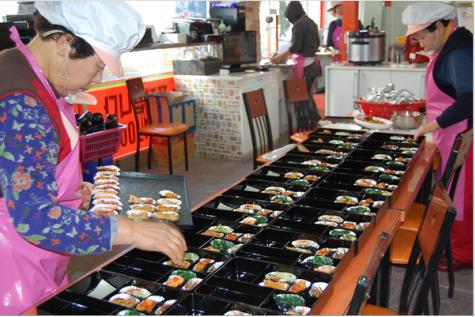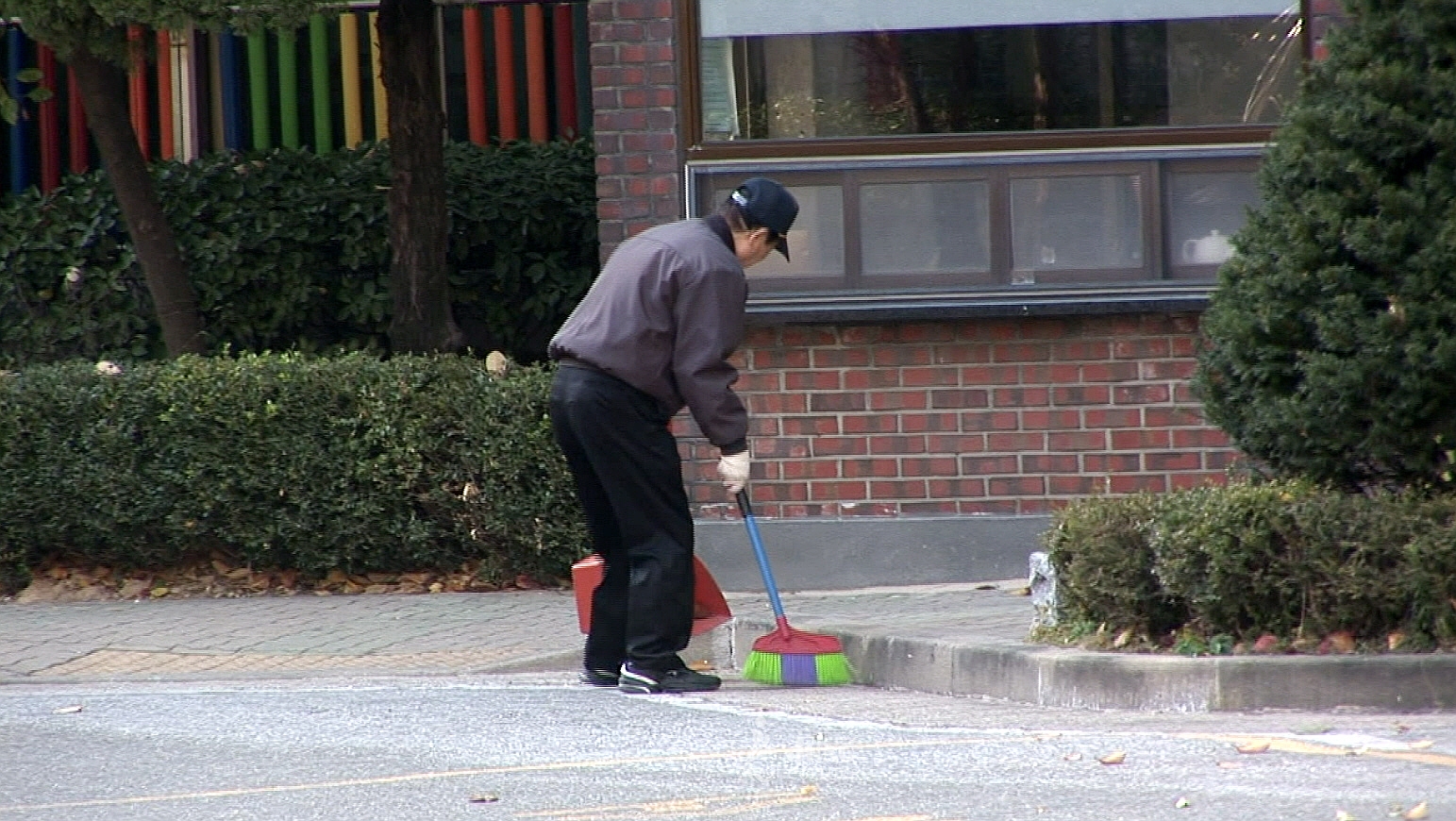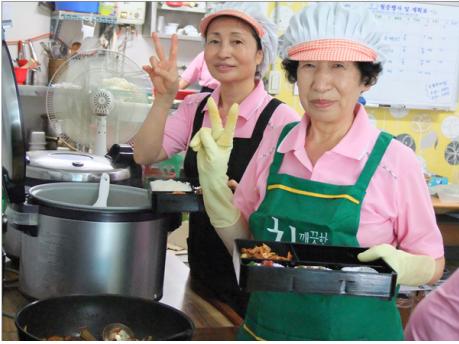As our average life expectancy increases and medical technology develops, the expression the ‘100 year generation’ has emerged. This expression defines the trend where people are living longer than before, which also means they live longer after official retirement. As a result, a lot of people are working during their senior years in order to sustain themselves. To examine the reality of this trend, the Dankook Herald (DKH) investigated the growing phenomenon of senior part time employment.
 |
| ▲ Seniors are preparing lunch boxes. |
These days the image associated with part time jobs is changing. As you can see from the two pictures, the number of working seniors is on the rise. Moreover, the number of working seniors is greater than that of people in 20s, a demographic that traditionally makes up the majority of part-time labor. Experts who analyzed this trend have found the reason for the change stems from poor preparation for retirement and insufficient welfare for seniors. According to the National Statistical Office, the average retirement age of a laborer is 52.6. However after they retire, they find it difficult to separate from the workplace because of things such as the need to prepare for their son or daughter’s wedding. Therefore, they try to re-join the employment market, but normally fail to find stable work. AS a result, they agree to a part time job rather than secure permanent full time employment.
The DKH interviewed two elderly gentlemen; Hwang Jin-tae who works at CGV and Choi Hyun-suk who works as a university guard. The DKH asked them why they sought work post-retirement in the first place. Mr. Choi answered that he decided to work because he had to earn a living and pay for the education expenses of his children. Mr. Hwang however chose to continue working to stay healthy and feel useful. He said, “When I was a student, my major was electronic engineering, so I got a job working for Hyundai-Electronics (At that time, it was called SK-Hynix). Several years ago I had to retire because I had reached the mandatory working age limit, but I did not want to be a man stuck in the house. I thought working could prevent dementia, so I applied to be the cleaner in the CGV.”
Secondly the DKH asked what made them prefer part time jobs and were there any jobs they were reluctant to do. They remarked that they were reluctant to do jobs that make them move a lot or use strength. “Consequently, I prefer School Sheriff as a job. It does not require difficult physical work. Moreover, the wage is higher than many other jobs,” Mr. Hwang explained.
The DKH also asked what problems they encounter looking for a job and how they managed to find work. “I think there are too few jobs for old people in Korea. For example, I went to a senior career fair at the Seoul Trade Exhibition and Convention Centre. Where I’m working now, CGV, was a popular choice amongst seniors. Thousands of people applied for this position. Jobs for seniors can be divided into three categories. There are subway parcel delivery services, cleaners, and guards. In my case, I have not reached the age of 65, so for that reason I could not apply for the subway parcel delivery service. Guard jobs weren’t a match for me because the positions were mostly night shift, so, I opted to be a cleaner. I really had no choice. It requires light physical work,” Mr. Hwang said.
Mr. Hwang further explained “Cleaning work is easy for me, but as I get old, I can see my body is getting weaker and I am worried about the dangers of the job. For example my friend, who tried to be a CGV cleaner, quit the job after just one month because of an injury. While working at the CGV, he lost his footing and pulled a tendon. He had to go to the hospital and since then, he hasn’t been able to work anymore. To prevent this from happening to me, I have a lot of stretching to do before I head to work.” He added, “Although it is not an arduous work, it is better than being stuck in the house and I’m thankful that there is place that l still can be useful.”
A Wage Peak System (WPS) means a company gradually reduces the salary of older employees after they reach a certain age in return for job security. The DKH asked Choi and Hwang what their opinions were about a WPS. Mr. Choi answered that “The system could lower the number of seniors requiring part time jobs, however I think creating a program to help the retiree is more important. People have to live their life for decades after they retire.” However Mr Hwang argued that, “Nowadays, It is difficult these days for young people to find permanent work upon graduation. Therefore, young people are getting married later than previous generations and having children too late. So to increase the employment rate of younger people, WPS is needed.”
 |
| ▲ An old man working as a guard. |
The increase in average life expectancy creates new employment problems. Thus, old people who wish to remain economically stable and relevant contributors to society take on appropriate jobs for old people. However people in their 60s or the elderly are receiving the least pay as compared to other part-timers. According to the ‘2015 Working Income Index Trends’ study by the Labor Board, the average hourly wage per person in 60s was only 369 won higher than the required minimum wage of 5,580 won. Moreover, because of the restricted supply and high demand for part time jobs for seniors, there is a great deal of job market competition. What is worse, working seniors who have overcome the competition still earn a meager paycheck. In fact, 45.6% of 1,998,000 reemployed workers in 2013 had an average paycheck of about 1.84 million won, which is 31% of the salary of skilled and long serviced workers.
There are several policies and organizations that help old people find a job. One of them is the Senior Club. The Ministry of Health and Welfare set up the club in 2001 to help support the economic and social development of old people. 200 clubs are located in 16 cities nationwide. The club motivates people over 65 to participate in job programs selected by local governments. The program can be classified into three division; public service, welfare, and education. Elders can work keeping traffic in order in school zones, work in library management, and maintain public service surveillance cameras. They also can provide cultural support for multicultural families. Moreover, they can be a nursery teacher, explaining forest ecology. The club also helps retirees obtain jobs where they can utilize their career skills. Andong senior club is a good example. 30,805 out of 168,242 people, or 20 percent of the overall Andong population, are old people. The club created jobs at cafes, lunch box stores, and with delivery businesses. These systems have an annual turnover of 270 million and allow old people to earn over seven hundred thousand won a month working only three days a week.
 |
| ▲ Seniors working at Andong Senior Club. |
In developed countries there are already expressions like ‘second life’, or ‘second career’ that describe the post retirement life of old people. Actually, nowadays everyone gets work that lasts as long as they are able to do the job. Unfortunately, in Korea, the spectrum of work for old people is limited. However, we should be looking at revising this situation. Older workers should be looking for work not only to sustain themselves, but also for a chance to develop a second career. Therefore, the government should develop systems to assist old people to find work easily. Also, the spectrum of jobs open to older people should be same as that open to younger workers.
김강산, 이정하, 박세훈, 이훈기 dkherald@hotmail.com

![[Campus Magnifier] Let's Surf the Library!](/news/photo/202404/12496_1765_4143.jpg) [Campus Magnifier] Let's Surf the Library!
[Campus Magnifier] Let's Surf the Library!
![[Campus Magnifier] Let's Surf the Library!](/news/thumbnail/202404/12496_1765_4143_v150.jpg)





